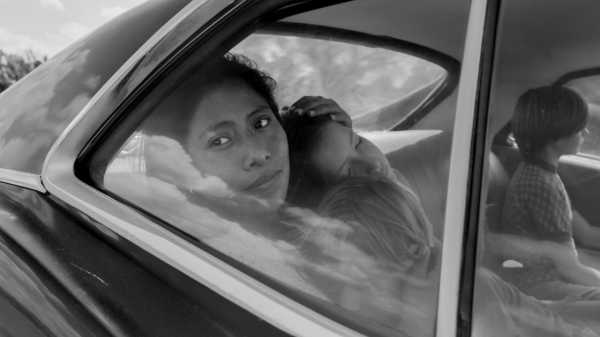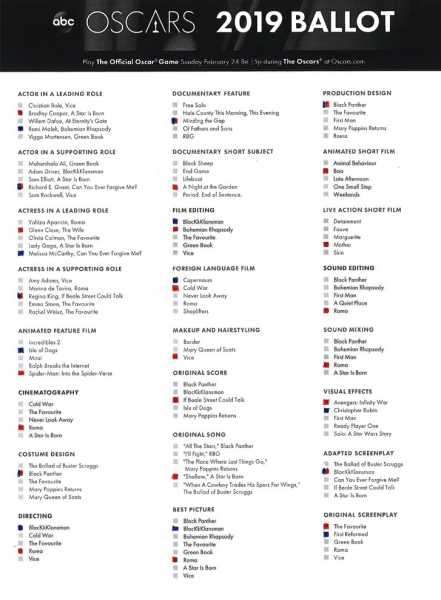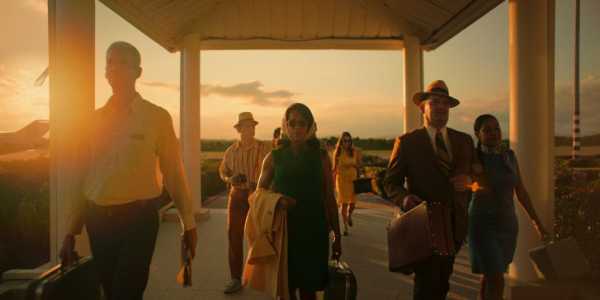
If producers didn’t have reason to believe that Oscars were good for their movies’ business, and if actors and technicians didn’t think that Oscars were important for their careers, none of them would spend six months of their lives putting new creative work aside to campaign for a prize with red carpets, talk shows, Q. & A.s, panel discussions, and press interviews. Martin Scorsese’s career was relaunched by his Oscar for “The Departed”—and artistically revitalized by the new opportunities that arose from that win. Mahershala Ali’s Oscar, for “Moonlight,” Viola Davis’s, for “Fences,” and Brie Larson’s, for “Room,” catapulted these actors to the industry’s commercial forefront; many other professionals on both sides of the camera have experienced similar boosts from their Oscars. But what the Oscars reward, celebrate, and promote, above all, is the movie industry at large—which is why this year’s edition appears to be flailing and floundering, haunted by a sense of desperation, confusion, and crisis.
That crisis is one of demography and of politics—and it reflects a longer-standing, seventy-year crisis that Hollywood has faced. The Academy has gone through an uncomfortable public reckoning in relation to the image projected by the Oscars’ broadcast ceremony—a stodgy, sometimes shticky, backward-looking self-celebration of a wealthy, and mostly white and male, industry—and this year its producers have in effect been airing their panic in public. They’re going ahead without a host (nobody was chosen to replace Kevin Hart, who withdrew in response to the resurfacing of his homophobic tweets); they announced they would cut the live performances of several nominated songs, and then restored them; they cut and then restored the live broadcast of awards in four categories, including cinematography and editing.
The crisis involves the perceived loss of viewership and, above all, of interest among young people, and the gap between the celebration of movies that are popular—that make lots of money—and the ones that win Oscars. It has been manifested, over the past decade, in the removal of honorary-Oscar winners (principally older folks) from the broadcast ceremony, and the expansion of the Best Picture category to fit up to ten films.The crisis is also political at its core and is animated by the desire not to alienate viewers who identify as conservatives. (That’s why, despite the country’s political crisis, the Academy didn’t pick a host such as Michelle Wolf.) The attempt to satisfy both the Academy’s members as well as its customers (i.e., the moviegoers) has become an impossible balancing act.
This crisis has been sparked, at least partly, by the emergence of streaming. Moviegoing has become an exceptional experience for most viewers, which means that exceptional measures must be taken to attract audiences and create awareness, celebrity, and urgency. Yet the crisis also has deeper roots—it reaches back to 1948, when a Supreme Court ruling forced the movie studios to relinquish their ownership of movie theatres and also removed barriers to competition from independent producers. At the same time, the sudden rise of television and the suburban boom cut deeply into many viewers’ moviegoing habits.
Peculiarly and ironically, Netflix (and, to a lesser extent, Amazon and other sites) is recapitulating the movie studios’ own past: far from being a mere distributor that serves as a portal for viewing films and series created by others, Netflix has become a major film producer, as seen in its thumping entrance into the prestige-cinema domain, most recently with “Roma” and “The Ballad of Buster Scruggs.”
In the short term, filmmakers benefit, because Netflix and other streaming sites bring money to the table to produce films that might not have been made otherwise. Yet Netflix is also doing what the studios did in their golden pre-1948 age: it’s producing, distributing, and exhibiting movies. The crisis of the film industry, and of the Academy, isn’t that people aren’t watching movies; it’s that the business entities that viewers are enriching with their streaming viewership aren’t the traditional clutch of studios. Yet it may not be only the majors who are menaced but also smaller distributors and independent producers, who today create the overwhelming preponderance of critically acclaimed, Oscar-nominated, and, truth be told, artistically significant movies. The danger, in the long run, is that Netflix and a few other prominent distributors will exert excessive control over what’s made and seen—will function as studios did in the nineteen-thirties, or even as they did in the seventies and eighties, when independents existed only at the margins of the industry.

Click to expand Richard Brody’s Oscars ballot, with his preferences marked in blue and his predictions marked in red.
To put it differently, the crisis of Hollywood and of the Academy is a two-part crisis—first, of theatrical distribution, of the practice of watching movies in theatres rather than on computer screens; then, of production being governed by that new distribution system and its handful of new potentates. Politically liberal Hollywood has become culturally conservative, exerting itself to preserve a practice—moviegoing—that’s on its way out. There’s irony, comedy, and pathos in the effort of movie people, on Oscars night, to create a successful TV show in order to shore up Hollywood’s ruins—to preserve both its mystique and its popularity.
My Oscars Predictions
Predicted winners are italicized.
Best Picture
“Black Panther”
“BlacKkKlansman”
“Bohemian Rhapsody”
“The Favourite”
“Green Book”
“Roma”
“A Star Is Born”
“Vice”
As usual, few of the Best Picture nominees are among the year’s best movies; this year, there are two, “BlacKkKlansman” and “Black Panther.” The others range from a good idea spoiled (“The Favourite,” which turns a fascinating strain of historical politics into a decorative revel in cruelty à la Michael Haneke) to a feast of sociopolitical self-congratulation in black-and-white aspic (“Roma”) to a misbegotten monstrosity from the start (“Green Book”). “BlacKkKlansman” is the best of the nine nominated films; “Roma”—which plays into Hollywood’s assumptions about the strong, steadfast, and silent working class, and does so with a garish aesthetic to rival that of last year’s winner, “The Shape of Water”—will win.
Actor in a Leading Role
Christian Bale, “Vice”
Bradley Cooper, “A Star Is Born”
Willem Dafoe, “At Eternity’s Gate”
Rami Malek, “Bohemian Rhapsody”
Viggo Mortensen, “Green Book”
If there were a Best High-Budget Selfies award, Bradley Cooper would have little competition for his self-exalting direction and performance in “A Star Is Born.” It won’t keep him from winning, though I’d be pleased if the Internet whispers in favor of Rami Malek, for “Bohemian Rhapsody,” were proved true. That movie is simplistic, but Malek does something with the role that’s more than impersonation: he brings an element of fear and self-perceived monstrosity to the character of Freddie Mercury, thereby adding a psychological dimension to it that the script didn’t come close to dramatizing.
Actress in a Leading Role
Yalitza Aparicio, “Roma”
Glenn Close, “The Wife”
Olivia Colman, “The Favourite”
Lady Gaga, “A Star Is Born”
Melissa McCarthy, “Can You Ever Forgive Me?”
In “Can You Ever Forgive Me?,” Melissa McCarthy invests the role of a floridly frustrated secret literary eminence with an exalted dialectical flair and a knife-edged comedic bitterness to match; her blend of creative joy and mournful pain makes her performance the best in this group, by far. In “Roma,” Yalitza Aparicio, who has never acted in a movie before, lends presence and grace to an underwritten and overdetermined role; in “The Favourite,” Olivia Colman (a beneficiary of category-shifting) is misdirected toward showy but empty comedy; in “A Star Is Born,” Lady Gaga takes the scraps that Cooper leaves her and feasts on them. (Had Gaga had a director who wanted to see her as much as he wanted to see himself, it would likely have been a performance for the ages.) Glenn Close, in “The Wife,” delivers a nuanced and vigorous performance in a dully directed and flimsily contrived role, though it would have been just as invigorating to see her sit at a table and read from the novel on which the movie was based (or any other); six other times a nominee, she will, on this seventh occasion, win a virtual career-achievement Oscar.
Actor in a Supporting Role
Mahershala Ali, “Green Book”
Adam Driver, “BlacKkKlansman”
Sam Elliott, “A Star Is Born”
Richard E. Grant, “Can You Ever Forgive Me?”
Sam Rockwell, “Vice”
Mahershala Ali is one of the most resonant, screen-filling actors of our time; would that this grand performance had been created for a clearer-minded movie. Adam Driver is one of the few actors whose very presence makes for a new kind of cinematic music; his performance in “BlacKkKlansman” is essential to the movie’s effect, but the movie’s conception is nonetheless larger than his role in it. In “Can You Ever Forgive Me?,” Richard E. Grant brings an extraordinary, and extraordinarily graceful, range of emotion to a part that is itself tragicomic; the role, as written and directed, makes great demands on an actor, and Grant meets and surpasses them with both his personality and his artistry. I think that the Academy won’t fail to notice.
Actress in a Supporting Role

Regina King tears through the screen with the immediacy and intensity of her performance in “If Beale Street Could Talk.”
Photograph Courtesy Annapurna Pictures
Amy Adams, “Vice”
Marina de Tavira, “Roma”
Regina King, “If Beale Street Could Talk”
Emma Stone, “The Favourite”
Rachel Weisz, “The Favourite”
Rachel Weisz’s performance in “The Favourite” brings complexity and ambiguity where it isn’t otherwise found; her performance is the best thing about the movie (along with the political threads that get lost in the melodramatic tangle). But Regina King virtually tears through the screen with the immediacy and intensity of her performance in “If Beale Street Could Talk,” a movie that was largely under-recognized in the nominations but will, I think, at least be acknowledged here.
Directing
Spike Lee, “BlacKkKlansman”
Pawel Pawlikowski, “Cold War”
Yorgos Lanthimos, “The Favourite”
Alfonso Cuarón, “Roma”
Adam McKay, “Vice”
This is one of the two most accursed of categories. Spike Lee’s direction of “BlacKkKlansman” is among the year’s best; Lee has never won an Oscar for directing, and never even been nominated. The list otherwise does the Academy no honor, especially not for the exclusion of Marielle Heller, whose delicate control of tone and mood, along with the calmly fierce precision of images, gives “Can You Ever Forgive Me?” a grand and mournful power. But for the Academy, size matters—the crowd scenes and geographical span of “Cold War,” the palatial pomp and decorative profusion of “The Favourite,” the theatrical preciosity of “Roma,” and the sketch-comedy bombast of “Vice” shout quantity rather than quality of direction, while Heller created a work of chamber music, an intensely local film that nonetheless reflects a vast historical imagination. Even if it’s not, to my mind, one of the handful of best movies of the year, it’s close, and far superior to most of the nominees, in both the Directing and Best Picture categories. And, speaking of “historical,” that’s what all five nominated movies are.
Animated Feature Film
“Incredibles 2,” Brad Bird
“Isle of Dogs,” Wes Anderson
“Mirai,” Mamoru Hosoda
“Ralph Breaks the Internet,” Rich Moore and Phil Johnston
“Spider-Man: Into the Spider-Verse,” Bob Persichetti, Peter Ramsey, and Rodney Rothman
“Isle of Dogs” is by far the most accomplished and original of these films; it could as readily have been a Best Picture nominee. “Spider-Man: Into the Spider-Verse,” which is taken for original in the narrow spectrum of superhero movies (and which also has an appealing array of characters whose droll interactions are novel for the severely limited genre), will win.
Animated Short Film
“Animal Behaviour,” Alison Snowden and David Fine
“Bao,” Domee Shi
“Late Afternoon,” Louise Bagnall
“One Small Step,” Andrew Chesworth and Bobby Pontillas
“Weekends,” Trevor Jimenez
Don’t bet against Pixar.
Adapted Screenplay
“The Ballad of Buster Scruggs,” Joel Coen and Ethan Coen
“BlacKkKlansman,” Charlie Wachtel, David Rabinowitz, Kevin Willmott and Spike Lee
“Can You Ever Forgive Me?,” Nicole Holofcener and Jeff Whitty
“If Beale Street Could Talk,” Barry Jenkins
“A Star Is Born,” Eric Roth, Bradley Cooper, and Will Fetters
The toughest category: four of the five films, and their scripts, are enduringly great. (The surprise was to learn that the Coen brothers’ screenplay is adapted.) I suspect that “BlacKkKlansman” will win, because of its painful present-day reverberations, and because of the power of its final cinematic coup.
Original Screenplay
“The Favourite,” Deborah Davis and Tony McNamara
“First Reformed,” Paul Schrader
“Green Book,” Nick Vallelonga, Brian Currie, and Peter Farrelly
“Roma,” Alfonso Cuarón
“Vice,” Adam McKay
In “First Reformed,” Paul Schrader crafts some scenes of a volatile spiritual intensity to rival ones by Carl Theodor Dreyer; I expect that the Academy, prostrate before quantity rather than quality of writing and, above all, before the aspirational refinement of Britwit, will honor “The Favourite.”
Cinematography
“Cold War,” Lukasz Zal
“The Favourite,” Robbie Ryan
“Never Look Away,” Caleb Deschanel
“Roma,” Alfonso Cuarón
“A Star Is Born,” Matthew Libatique
To the Academy, nothing says art more than black-and-white; the images of “Roma,” more conspicuously retouched than those of “Cold War,” will take the prize.
Documentary Feature

The Academy would do well to award “Minding the Gap” for its multifaceted portrayal, spanning a decade, of intimate experience.
Photograph Courtesy Hulu
“Free Solo,” Jimmy Chin and Elizabeth Chai Vasarhelyi
“Hale County This Morning, This Evening,” RaMell Ross
“Minding the Gap,” Bing Liu
“Of Fathers and Sons,” Talal Derki
“RBG,” Betsy West, Julie Cohen
I’d hate to choose between “Hale County” and “Minding the Gap,” two original, personal, passionate, and moving films; picking either, the Academy would do the right thing, and I suspect that “Minding the Gap,” for its multifaceted portrayal, spanning a decade, of intimate experience as it relates to race, economics, violence, ingrained gender roles, and stifled family agonies, will win.
Documentary Short Subject
“Black Sheep,” Ed Perkins
“End Game,” Rob Epstein and Jeffrey Friedman
“Lifeboat,” Skye Fitzgerald
“A Night at the Garden,” Marshall Curry
“Period. End of Sentence.,” Rayka Zehtabchi
“A Night at the Garden” is a short, fascinating, appalling found-footage documentary, showing a rally of Nazi sympathizers packing Madison Square Garden (then at Fifty-third Street and Eighth Avenue) in 1939 and acclaiming white-supremacist, anti-Semitic speeches on a swastika-festooned podium with their raised-right-arm salutes. Though the footage isn’t used in any original way, this film will win, because it feels, of course, shockingly contemporary.
Live-Action Short Film
“Detainment,” Vincent Lambe
“Fauve,” Jeremy Comte
“Marguerite,” Marianne Farley
“Mother,” Rodrigo Sorogoyen
“Skin,” Guy Nattiv
The stunt cinematography of “Mother”—which is done mainly in one very long take—is too tricksy for the standard but clever suspense story that it conveys; it’s broadcast-ready.
Foreign-Language Film
“Capernaum” (Lebanon)
“Cold War” (Poland)
“Never Look Away” (Germany)
“Roma” (Mexico)
“Shoplifters” (Japan)
The worst category this year, and a reliably unsatisfying one because of the Academy’s absurd self-imposed rule to let an official board in each country choose its nominees. In some countries, films by opponents of the government are guaranteed to be pushed aside; in others, audacious work is overlooked in favor of presumptively popular titles. The Lebanese director Nadine Labaki’s “Capernaum,” with its bitter vision of stifling traditions reducing girls to chattel and of migrants and refugees subjected to exploitation and blackmail—and its framework of an indignant, independent-minded boy’s existential challenge to an impossible order—is slightly better than the others, but it won’t win; odd to think that “Roma,” already likely for Best Picture, would win here, too. My guess is that “Cold War,” with its postcard version of history, will win.
Film Editing
“BlacKkKlansman,” Barry Alexander Brown
“Bohemian Rhapsody,” John Ottman
“Green Book,” Patrick J. Don Vito
“The Favourite,” Yorgos Mavropsaridis
“Vice,” Hank Corwin
“BlacKkKlansman” is brilliantly edited by Barry Alexander Brown (the sequence of Kwame Ture’s public address is one of the finest in any film of the year), but “Bohemian Rhapsody,” with its concert scenes edited to resemble the bland jumble of broadcast television, will win.
Sound Editing
“Black Panther,” Benjamin A. Burtt and Steve Boeddeker
“Bohemian Rhapsody,” John Warhurst
“First Man,” Ai-Ling Lee and Mildred Iatrou Morgan
“A Quiet Place,” Ethan Van der Ryn and Erik Aadahl
“Roma,” Sergio Diaz and Skip Lievsay
This category is about the sounds (whether recorded during the shoot or created in a sound studio) that go into the film. As such, it rewards artifice. The sound of “Roma” is unduly artificial, and will win. (The triumph of “Roma” is that it’s a work of pseudo-neorealism that’s given the full Hollywood treatment of technical wizardry that’s pushed to the front for applause.)
Sound Mixing
“Black Panther”
“Bohemian Rhapsody”
“First Man”
“Roma”
“A Star Is Born”
Essentially, sound design: the contours of the elements, what’s brought up, faded out, and when. The surround-sound manipulations of “Roma,” with their overly cute tricks, should win here, too.
Production Design

The ardent world-building of “Black Panther” is as much physical as it is dramatic.
null
“Black Panther,” Hannah Beachler
“First Man,” Nathan Crowley and Kathy Lucas
“The Favourite,” Fiona Crombie and Alice Felton
“Mary Poppins Returns,” John Myhre and Gordon Sim
“Roma,” Eugenio Caballero and Bárbara Enrı́quez
The ardent world-building of “Black Panther” is as much physical as dramatic; its design has a personal urgency that comes through.
Original Score
“BlacKkKlansman,” Terence Blanchard
“Black Panther,” Ludwig Goransson
“If Beale Street Could Talk,” Nicholas Britell
“Isle of Dogs,” Alexandre Desplat
“Mary Poppins Returns,” Marc Shaiman and Scott Wittman
Nicholas Britell’s score for “If Beale Street Could Talk” will win for its nearly classic, golden-age, symphonically inspired movie-music romanticism.
Original Song
“All the Stars,” from “Black Panther,” Kendrick Lamar and SZA
“I’ll Fight,” from “RBG,” Diane Warren and Jennifer Hudson
“The Place Where Lost Things Go,” from “Mary Poppins Returns,” Marc Shaiman and Scott Wittman
“Shallow,” from “A Star Is Born,” Lady Gaga, Mark Ronson, Anthony Rossomando, Andrew Wyatt, and Benjamin Rice
“When a Cowboy Trades His Spurs for Wings,” from “The Ballad of Buster Scruggs,” David Rawlings and Gillian Welch
“Shallow” is already a thing, far beyond the confines of the movie. It will win.
Makeup and Hairstyling
“Border”
“Mary Queen of Scots”
“Vice”
Tough one: three films that depend on makeup and hair; “Vice” will win, because its transformation of Christian Bale into Dick Cheney is a measurable achievement.
Costume Design
“The Ballad of Buster Scruggs,” Mary Zophres
“Black Panther,” Ruth E. Carter
“The Favourite,” Sandy Powell
“Mary Poppins Returns,” Sandy Powell
“Mary Queen of Scots,” Alexandra Byrne
“The Favourite” has the kind of period-costume work that tends to win, but the costumes of “Black Panther” are both essential to its drama and wondrously inventive.
Visual Effects
“Avengers: Infinity War”
“Christopher Robin”
“First Man”
“Ready Player One”
“Solo: A Star Wars Story”
“Avengers: Infinity War” wins for one scene, the climactic frittering of ashes—if enough members of the Academy got to the end of their screeners.
Sourse: newyorker.com






